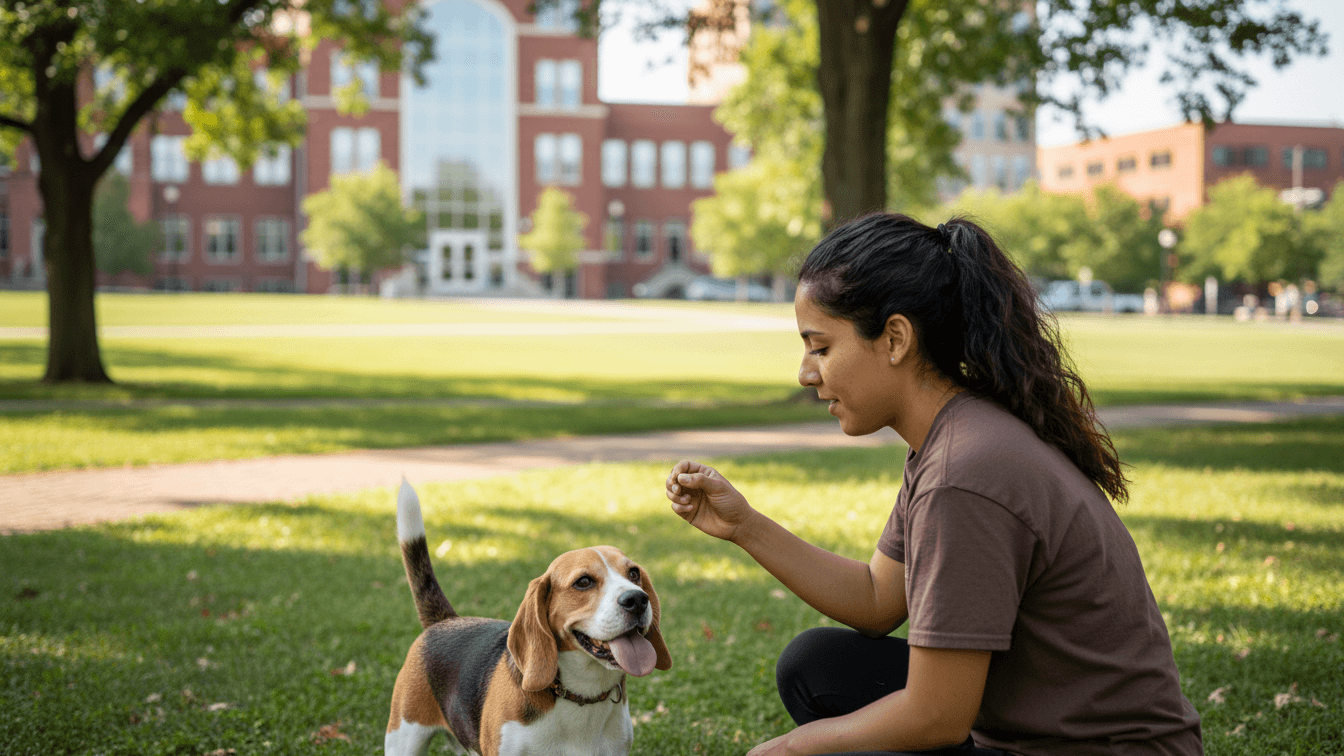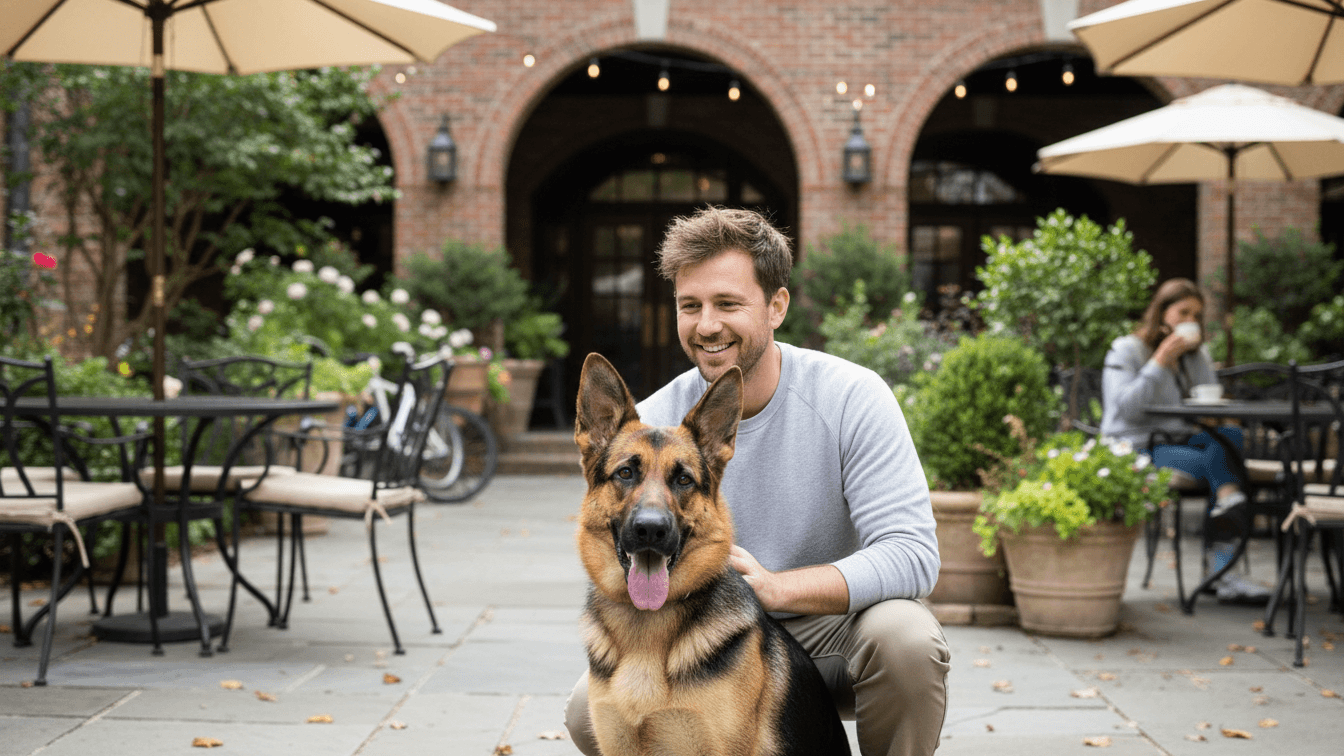Your Complete Guide to Choosing a Dog Trainer in Illinois and Surrounding Areas
Living with a dog in Illinois means navigating everything from Chicago’s crowded sidewalks to the quiet suburban trails of DuPage County and the rural farmlands downstate. Your dog needs to handle leash walks near busy storefronts, stay calm at crowded farmers markets, and behave politely whether you’re visiting a lakefront park or a small-town festival.
Illinois doesn’t require special licensing for dog trainers, but the state does have clear rules about animal welfare, rabies vaccination, and local leash laws that vary by municipality. Finding a trainer who understands these regional differences will help you get better results both at home and out in your community.
How to Choose the Right Trainer
Start by looking for someone who uses positive reinforcement training and can set realistic goals based on where you actually live in Illinois. A trainer working with city dogs in Chicago needs to address different challenges than someone helping rural clients in downstate areas, from navigating public transit to managing livestock distractions.
Credentials give you a quick way to compare trainers’ experience levels. Common dog trainer certifications include KPA-CTP, CPDT-KA, or IAABC-CDBC for serious behavior problems. If your dog shows aggression or severe reactivity, look for someone with CBCC-KA or a science-based program like CTC.
In-home dog training works great for puppy manners, door greetings, and neighborhood leash skills. Group classes make sense once your dog can focus around other dogs, especially before you tackle busy locations like downtown areas or crowded park events.
Ask whether the trainer has liability insurance. Professional dog trainers who carry coverage show they take their business seriously and protect both themselves and their clients.
Common Dog Training Methods Explained

Reward-based methods build trust while creating lasting behavior changes. They also help you follow local leash laws and nuisance ordinances without relying on fear or intimidation.
Basic obedience covers sit, down, stay, place, recall, and leash training so your dog can handle walks, restaurant patios, and park visits without pulling or jumping on people. These skills form the foundation for everything else you’ll teach.
Puppy training focuses on socialization, potty training, bite control, crate comfort, and early leash manners. Starting with short, positive training sessions prevents bad habits from forming in the first place.
Behavior modification addresses fear, reactivity, resource guarding, or separation anxiety through careful desensitization and counterconditioning. For serious cases, ask if your trainer works with local veterinarians who can rule out medical causes or prescribe medication when needed.
Private lessons and in-home sessions let you customize everything around your daily routines. Day training can speed up results when you’re short on time, with the trainer working your dog during the day and then teaching you how to maintain the progress.
Group classes help your dog practice good manners around other dogs and people. The best dog training classes give dogs plenty of space, screen participants carefully, and teach calm behavior rather than just excitement.
Specialized training like therapy dog training or service dog training requires extra structure, public-access skills, and a very clear step-by-step training program. Make sure any trainer offering these services understands the legal requirements and testing standards involved.
Stay away from trainers who use fear, intimidation, or pain to get results. Humane methods are safer for everyone, easier to maintain long-term, and much better for keeping peace with your neighbors.
Average Cost of Dog Training in Illinois (Updated for 2025)
Prices across Illinois depend on the trainer’s experience, how long sessions last, and where the training happens. Urban areas like Chicago and its suburbs generally run higher than downstate regions, but quality training is available at various price points throughout the state.
| Service Type | Average Cost (Illinois) |
|---|---|
| Puppy classes (4-6 weeks) | $140-$300 total |
| Group obedience classes (4-6 weeks) | $150-$325 total |
| Private lessons (60-90 min) | $100-$200 per session |
| In-home coaching packages (4-6 visits) | $400-$950 total |
| Day training (trainer works your dog + handoff) | $425-$1,000 per week |
| Behavior consult for reactivity/anxiety (initial) | $135-$275 |
| Board and train (2-4 weeks) | $1,900-$4,800 total |
You’ll probably pay extra travel fees for longer distances, especially in rural counties. Expect higher rates for complex behavior work that requires specialized expertise.
Make sure you understand what’s included in the quoted price, how the trainer tracks progress, and whether they offer a free consultation or free evaluation before you commit to a training program.
Questions to Ask a Potential Dog Trainer
- What training methods do you use, and how do you keep sessions positive and low-stress?
- What credentials do you have, like CPDT-KSA or KPA-CTP? Do you keep up with continuing education?
- How will you customize the training plan for my dog’s specific needs and our Illinois lifestyle?
- Do you offer in-home visits, dog training classes, or day training, and which approach fits my goals best?
- How will we measure my dog’s progress and know when to add more distractions?
- What are the total costs, including any travel fees, and what’s your cancellation policy?
- Do you carry liability insurance, and can you show me proof?
- For behavior problems, will you work with my veterinarian if needed?
- What should I practice between our training sessions to help my dog keep improving?
Local Illinois Rules and Considerations
Illinois enforces leash laws and nuisance rules at both state and local levels. Each municipality sets its own specific regulations, so check with your city or village for exact requirements.
The Illinois Animal Control Act gives local governments authority to regulate dogs through leash laws, licensing, and nuisance ordinances. Most cities and suburbs require leashes in public spaces except inside designated off-leash dog parks.
Illinois law requires current rabies vaccination for all dogs over four months old. Your veterinarian will provide a certificate and tag that must be kept on your dog’s collar. The Illinois Department of Public Health oversees rabies control and provides resources about vaccination requirements.
Excessive barking can be considered a nuisance under local ordinances. Work with your trainer on alert barking and separation anxiety before neighbors file complaints with animal control.
The Illinois Humane Care for Animals Act sets minimum standards for anyone who boards, breeds, or sells dogs. If your trainer offers board and train services, their facility should meet these state requirements.
Illinois doesn’t require special licenses for dog trainers themselves. Trainers follow normal business regulations, but certified dog trainer credentials show they’ve met professional standards through testing and continuing education.
The Illinois Dangerous Dog Act addresses dogs with bite histories or aggressive behavior. If your dog has been declared dangerous, work with a qualified professional who understands behavior modification and the legal requirements you’ll need to meet.
Local Illinois Resources for Dog Owners
These spots give you great places to practice polite manners, work on recalls, and provide safe enrichment for your dog. Always follow posted rules and etiquette guidelines.
- Montrose Dog Beach in Chicago offers a fenced lakefront area where dogs can swim and play off-leash from May through October.
- Grant Park’s south end in Chicago welcomes leashed dogs and provides excellent opportunities for practicing focus around crowds, festivals, and urban distractions.
- Wiggly Field Dog Park in Chicago’s Lakeview neighborhood features separate areas for large and small dogs with plenty of space for recall practice.
- The Illinois and Michigan Canal State Trail runs 61 miles and welcomes leashed dogs for long training walks through varied terrain.
- Starved Rock State Park allows leashed dogs on most trails, giving you perfect opportunities to build focus around wildlife, families, and other hikers.

FAQs
How much does in-home dog training cost?
Most Illinois trainers charge $100-$200 per in-home visit, with discounts available when you buy packages. Behavior problems typically start at the higher end of that range.
Is in-home dog training worth it?
Absolutely, because you’re working on problems exactly where they happen. Your trainer can fix door manners, jumping on guests, counter-surfing, and yard reactivity right at home, then step outside to practice leash skills on your actual neighborhood sidewalks.
Can you pay someone to house train your dog?
Yes, many trainers offer puppy training programs that include potty training, crate routines, and daily schedules. Day training can speed up the process while teaching you how to maintain the progress.
What is the 3-3-3 rule for dog training?
This is a helpful timeline for new or adopted dogs: expect about 3 days for your dog to decompress, 3 weeks to learn your routines, and 3 months to feel completely settled. Good training programs work with this natural adjustment period.
How long will it take to reach my training goals?
Most puppies and friendly adult dogs show solid progress within 4-8 weeks if you practice daily. Fear, reactivity, or aggression typically requires several months of careful behavior modification with gradual increases in difficulty.
What should I bring to group classes?
Pack a flat collar or harness, a 6-foot leash, high-value treats, water, and current vaccination records if your trainer requests them. Leave retractable leashes at home for safety reasons.
What’s the leash law in Illinois?
Leash laws vary by municipality throughout Illinois. Most cities require dogs to be leashed and under control in all public areas except inside designated off-leash dog parks. Check with your local city or village for specific regulations.
Do I need a dog license in Illinois?
Licensing requirements vary by county and municipality. Many Illinois cities require annual dog licenses, while others do not. Contact your local city hall or animal control office for specific requirements in your area.
What shots does my dog need in Illinois?
Illinois law requires rabies vaccination for all dogs over four months old. Your veterinarian may also recommend distemper-parvo, bordetella, and other vaccines based on your dog’s lifestyle and risk factors.
Are dog trainers required to be licensed in Illinois?
No special trainer licenses exist in Illinois. Dog training services follow normal business regulations. However, if a trainer offers board and train or any boarding services, their facility must meet requirements under the Illinois Humane Care for Animals Act.
Where can I practice off-leash recall?
Use fenced dog parks to keep things safe and legal. Illinois has dozens of designated off-leash areas where you can work on recall and socialization with your dog.
Which dog parks allow training around Illinois?
All public dog parks allow you to work with your own dog on basic obedience and recall. Popular options include Montrose Dog Beach and Wiggly Field in Chicago, plus numerous suburban parks throughout the collar counties.
What beaches or trails allow dogs for training?
Montrose Dog Beach in Chicago is the most popular lakefront dog beach in Illinois. For trails, the Illinois and Michigan Canal State Trail, Starved Rock State Park, and Matthiessen State Park all welcome leashed dogs. These locations provide excellent opportunities to help your dog build focus around distractions.
What should I do if my dog is reactive?
Work with a certified dog trainer who specializes in behavior modification. Reactivity often requires careful desensitization, counterconditioning, and management strategies tailored to your specific situation and environment.
How do I find a well-behaved dog trainer?
Look for expert dog trainers with professional certifications, positive reviews, liability insurance, and experience addressing your specific concerns. Ask about their training methods and request references from past clients.
The right combination of thoughtful planning, humane methods, and consistent practice will help your dog become a confident, well-behaved companion throughout Illinois. Whether you’re navigating city sidewalks or exploring state parks, professional dog training services can make every outing more enjoyable for both you and your top dog.
